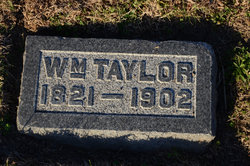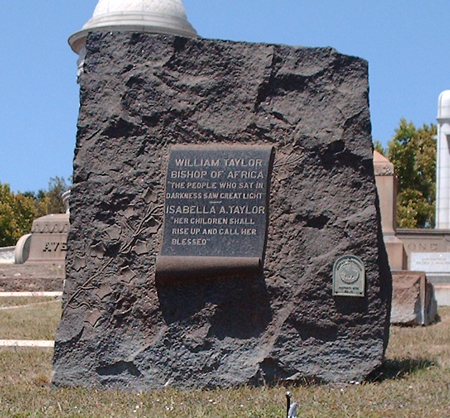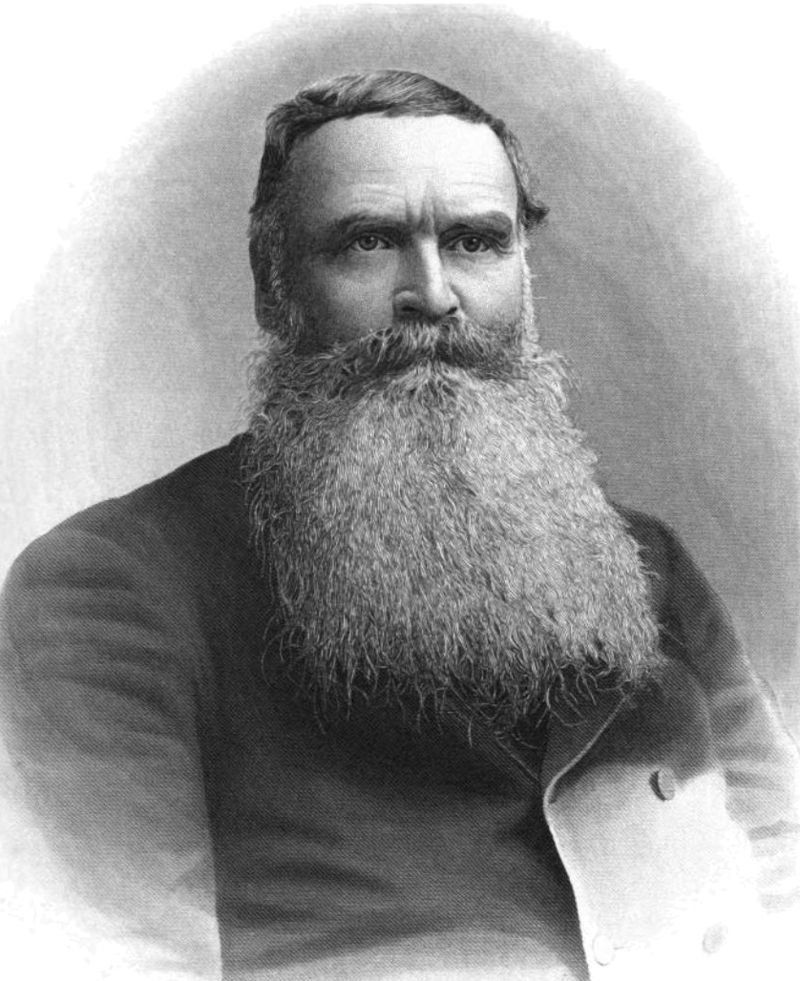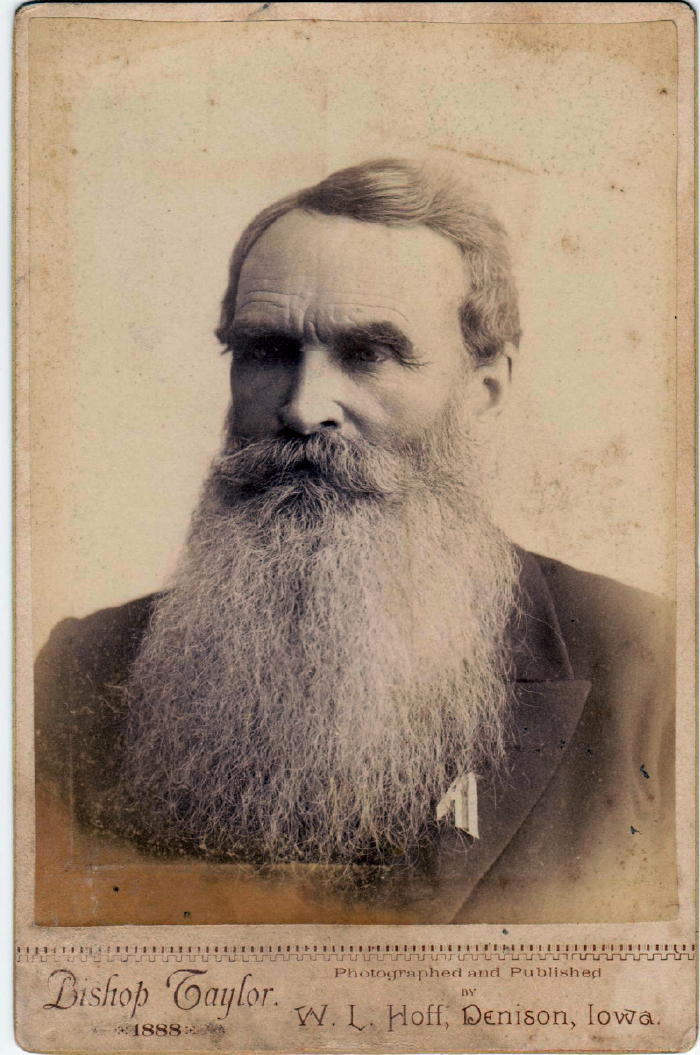Morton, Oren Frederic
A History of Rockbridge County, Virginia, 1920, Page 273
--includes a lengthy biographical sketch of the Taylor family
--When William was admitted to the Baltimore Conference in 1845, his Presiding Elder announced to the assemblage that "Here is a young man whom the sun never finds in bed."
He was very successful as an evangelist and his unusual gift of song was a wonderful help to him.
Obituary
Alameda Daily Sentinel
Alameda, California
May 19, 1902
TAYLOR.--Rev. William Taylor, D.D., the venerable missionary Bishop of the Methodist Episcopal Church, died yesterday afternoon at the home of his son, Rev. Ross Taylor , in Palo Alto. After lying unconscious for two days, the Bishop passed away peacefully at 4:25 o'clock, his wife, Mrs Isabelle Anne Taylor, and members of his family being at his side. Bishop Taylor had been feeble for a year or more, but was able to be about the house up to a week ago. The end came in a breaking up of his iron constitution at an advanced age, after a life crowded with activities and good works in all parts of the world. He had no chronic trouble, save that for two years he had lost control of his voice and only at rare intervals could he make himself heard clearly. Although he had been attended by Dr. F. Hayden Moss for five days prior, he did not take to his bed until last Tuesday. The Bishop was thought to be very low last Wednesday night, but he rallied and was conscious on Thursday, although he could say but a few words. On Friday night he was unconscious, but in the afternoon Dr. F. D. Bovard, editor of the California Christian Advocate, was with the stricken man for some time and the Bishop showed that he knew him and understood his words. He went into a state of coma Friday night, from which he never emerged. On Tuesday he had said, "I am nearing the shore." Late in April he predicted that his death would occur within a few weeks, and he said he was only waiting patiently for the summons. The funeral service will be held very simply in the local Methodist Episcopal church at Palo Alto, although doubtless many Methodists on the Coast who knew and revered the pioneer missionary Bishop will attend. The service will be held tomorrow morning at 10:30 o'clock, and the interment will follow in the family plot in Mountain View Cemetery. Bishop Taylor was born in Rockbridge County, Va., on May 2, 1821, his ancestors having settled there as colonists more than a hundred years before. His grandfather was James Taylor, one of five brothers who emigrated from County Armagh, in the north of Ireland, and all of whom were identified in the struggle of this country against England for independence. One brother was killed in the American Revolution. When 21 years old Mr. Taylor began evangelistic work as a 'circuit rider,' and served later as pastor of churches in Georgetown, Baltimore and Washington. He came to California as a missionary in 1849. He did a great work among the rough miners, who knew him as 'Father Taylor.' The Bishop founded the first Methodist church in San Francisco, as well as the first Methodist church organizations in Alameda, San Jose, Santa Cruz, Sacramento and Jamestown. Seven thousand Kaffirs joined the church where he labored in South Africa and many thousands more in India, where he accomplished his greatest work. Bishop Taylor began his worldwide career as an evangelist in 1856. For five years he labored in the Eastern and Western States and Canada. He spent seven months in England and Ireland, and toured Asia Minor, Syria and Palestine. He returned to work in Australia, where he spent three years, and then went to South Africa where remarkable results were brought about through his preaching among the Kaffirs. In 1867 he went with his family to England and Scotland, He preached next on the island of Barbados, and later in British Guinea, in South America. He revisited Australia, and in 1870 reached Ceylon, where he had thousands of converts. Later he carried on a wonderful soul-saving work in Bombay, Madras, and other cities, where two annual Methodist Conferences grew out of his labor. He went 1500 miles up the Amazon, then labored in Peru and Chile. At one time he had forty-three missionaries for his work in South America, which, like that in Africa, was on his plan of self-support. In Chile he organized a university, which is still the leading educational institution of that country. When he attended the General Conference of the Methodist Episcopal Church, which was to make him Bishop, he appeared in the humble capacity of a lay delegate from the South India Conference. Africa as a mission field was a problem then before the conference, and with no idea that he would return to the Dark Continent, Mr. Taylor made a speech, in which he outlined the exigencies of the work in such a common-sense way that he was unanimously chosen to supervise the mission fields in that continent. He served as Bishop of Africa until 1898, when he was retired on account of age. For twelve years he labored in West Central Africa, where he established five chains of mission stations. Incidentally he established Illustrated Africa in New York, of which Henry M. Stanley was an associate editor. Bishop Taylor donated the original lot on Mound Street, in Alameda, where the First Methodist Episcopal Church formerly stood. There are four surviving children, Morgan Stuart Taylor, City Recorder of Alameda, State Senator Edward K. Taylor, Rev. Ross Taylor, and Henry R. Taylor, City Editor of the Sentinel. Bishop Taylor was a member of the Society of California Pioneers, of which M. S. Taylor is the youngest original member. Bishop Taylor's remarkable physique fitted him for his strenuous labors in many climates. He wrote a dozen books during his time and in his five years of evangelistic work in the western states and Canada frequently carried his books with him. In carpetbags he could carry 500 pounds without straining a muscle. He was a great swimmer and in early days once accomplished the feat of swimming across San Francisco Bay to Alameda. There were no boats at the time and he had need of haste, he swam the entire distance. The Bishop had a rich fund of wit and humor and was an inimitable storyteller, few having had the experience of life that was his to draw upon. Modesty and spirituality were prominent characteristics. He never took distance or obstacles into account, and was always ready for an errand of service upon the call of the Master, as he said, 'to any part of this world or any other world.' It was always a great cross to him to leave his family. After many journeys with him his wife felt it her duty to settle down in California to raise and educate their sons. When the bishop went to Africa on one occasion he tarried in Brussels to call upon King Leopold, who had a great interest in the Congo Free State. the bishop was told that he could get an interview with King through the usual 'red tale' in about three days. That did not suit the great missionary's ideas of simple directness. Unescorted he walked across the lawn to the palace and saw King Leopold in ten minutes. In Africa William Taylor was a wonder to th natives. when he was 75 he walked over 400 miles into the interior, and labored with his missionaries in the fields, digging wells and building homes. The natives gave him the title of 'Great Well Digger and Long Walker.' Now his life, crowded with good works, is over, and he has found his reward, as he 'who wraps the drapery of his couch about him and lieth down to pleasant dreams.' Heaven's gates were opened wide last night.
Morton, Oren Frederic
A History of Rockbridge County, Virginia, 1920, Page 273
--includes a lengthy biographical sketch of the Taylor family
--When William was admitted to the Baltimore Conference in 1845, his Presiding Elder announced to the assemblage that "Here is a young man whom the sun never finds in bed."
He was very successful as an evangelist and his unusual gift of song was a wonderful help to him.
Obituary
Alameda Daily Sentinel
Alameda, California
May 19, 1902
TAYLOR.--Rev. William Taylor, D.D., the venerable missionary Bishop of the Methodist Episcopal Church, died yesterday afternoon at the home of his son, Rev. Ross Taylor , in Palo Alto. After lying unconscious for two days, the Bishop passed away peacefully at 4:25 o'clock, his wife, Mrs Isabelle Anne Taylor, and members of his family being at his side. Bishop Taylor had been feeble for a year or more, but was able to be about the house up to a week ago. The end came in a breaking up of his iron constitution at an advanced age, after a life crowded with activities and good works in all parts of the world. He had no chronic trouble, save that for two years he had lost control of his voice and only at rare intervals could he make himself heard clearly. Although he had been attended by Dr. F. Hayden Moss for five days prior, he did not take to his bed until last Tuesday. The Bishop was thought to be very low last Wednesday night, but he rallied and was conscious on Thursday, although he could say but a few words. On Friday night he was unconscious, but in the afternoon Dr. F. D. Bovard, editor of the California Christian Advocate, was with the stricken man for some time and the Bishop showed that he knew him and understood his words. He went into a state of coma Friday night, from which he never emerged. On Tuesday he had said, "I am nearing the shore." Late in April he predicted that his death would occur within a few weeks, and he said he was only waiting patiently for the summons. The funeral service will be held very simply in the local Methodist Episcopal church at Palo Alto, although doubtless many Methodists on the Coast who knew and revered the pioneer missionary Bishop will attend. The service will be held tomorrow morning at 10:30 o'clock, and the interment will follow in the family plot in Mountain View Cemetery. Bishop Taylor was born in Rockbridge County, Va., on May 2, 1821, his ancestors having settled there as colonists more than a hundred years before. His grandfather was James Taylor, one of five brothers who emigrated from County Armagh, in the north of Ireland, and all of whom were identified in the struggle of this country against England for independence. One brother was killed in the American Revolution. When 21 years old Mr. Taylor began evangelistic work as a 'circuit rider,' and served later as pastor of churches in Georgetown, Baltimore and Washington. He came to California as a missionary in 1849. He did a great work among the rough miners, who knew him as 'Father Taylor.' The Bishop founded the first Methodist church in San Francisco, as well as the first Methodist church organizations in Alameda, San Jose, Santa Cruz, Sacramento and Jamestown. Seven thousand Kaffirs joined the church where he labored in South Africa and many thousands more in India, where he accomplished his greatest work. Bishop Taylor began his worldwide career as an evangelist in 1856. For five years he labored in the Eastern and Western States and Canada. He spent seven months in England and Ireland, and toured Asia Minor, Syria and Palestine. He returned to work in Australia, where he spent three years, and then went to South Africa where remarkable results were brought about through his preaching among the Kaffirs. In 1867 he went with his family to England and Scotland, He preached next on the island of Barbados, and later in British Guinea, in South America. He revisited Australia, and in 1870 reached Ceylon, where he had thousands of converts. Later he carried on a wonderful soul-saving work in Bombay, Madras, and other cities, where two annual Methodist Conferences grew out of his labor. He went 1500 miles up the Amazon, then labored in Peru and Chile. At one time he had forty-three missionaries for his work in South America, which, like that in Africa, was on his plan of self-support. In Chile he organized a university, which is still the leading educational institution of that country. When he attended the General Conference of the Methodist Episcopal Church, which was to make him Bishop, he appeared in the humble capacity of a lay delegate from the South India Conference. Africa as a mission field was a problem then before the conference, and with no idea that he would return to the Dark Continent, Mr. Taylor made a speech, in which he outlined the exigencies of the work in such a common-sense way that he was unanimously chosen to supervise the mission fields in that continent. He served as Bishop of Africa until 1898, when he was retired on account of age. For twelve years he labored in West Central Africa, where he established five chains of mission stations. Incidentally he established Illustrated Africa in New York, of which Henry M. Stanley was an associate editor. Bishop Taylor donated the original lot on Mound Street, in Alameda, where the First Methodist Episcopal Church formerly stood. There are four surviving children, Morgan Stuart Taylor, City Recorder of Alameda, State Senator Edward K. Taylor, Rev. Ross Taylor, and Henry R. Taylor, City Editor of the Sentinel. Bishop Taylor was a member of the Society of California Pioneers, of which M. S. Taylor is the youngest original member. Bishop Taylor's remarkable physique fitted him for his strenuous labors in many climates. He wrote a dozen books during his time and in his five years of evangelistic work in the western states and Canada frequently carried his books with him. In carpetbags he could carry 500 pounds without straining a muscle. He was a great swimmer and in early days once accomplished the feat of swimming across San Francisco Bay to Alameda. There were no boats at the time and he had need of haste, he swam the entire distance. The Bishop had a rich fund of wit and humor and was an inimitable storyteller, few having had the experience of life that was his to draw upon. Modesty and spirituality were prominent characteristics. He never took distance or obstacles into account, and was always ready for an errand of service upon the call of the Master, as he said, 'to any part of this world or any other world.' It was always a great cross to him to leave his family. After many journeys with him his wife felt it her duty to settle down in California to raise and educate their sons. When the bishop went to Africa on one occasion he tarried in Brussels to call upon King Leopold, who had a great interest in the Congo Free State. the bishop was told that he could get an interview with King through the usual 'red tale' in about three days. That did not suit the great missionary's ideas of simple directness. Unescorted he walked across the lawn to the palace and saw King Leopold in ten minutes. In Africa William Taylor was a wonder to th natives. when he was 75 he walked over 400 miles into the interior, and labored with his missionaries in the fields, digging wells and building homes. The natives gave him the title of 'Great Well Digger and Long Walker.' Now his life, crowded with good works, is over, and he has found his reward, as he 'who wraps the drapery of his couch about him and lieth down to pleasant dreams.' Heaven's gates were opened wide last night.
Inscription
"William Taylor
Bishop of Africa"
The people who sat in
darkness saw great light.
Family Members
Sponsored by Ancestry
Advertisement
Advertisement


















